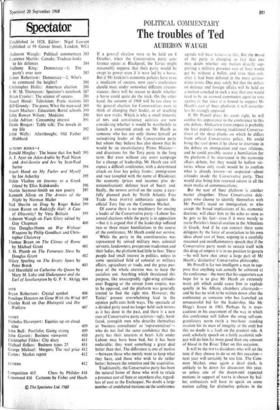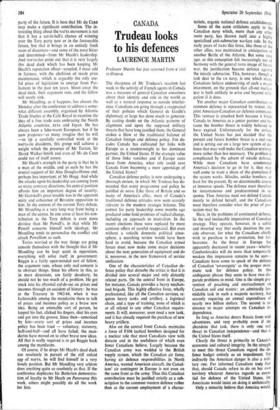The troubles of Ted
POLITICAL COMMENTARY AUBERON WAUGH
If a general election were to be held on 8 October, when the Conservative party con- ference opens at Blackpool, the Tories might reasonably suppose that their party would be swept to power even if it were led by a horse. But if Mr Jenkins's economic policies have even a modicum of success, next year's conference should meet under somewhat different circum- stances; there will be reason to doubt whether a horse could quite do the trick. On the other hand, the autumn of 1969 will be too close to the general election for Conservatives even to think of changing their leader, or of teaching him new tricks. Which is why a small minority of MPS and constituency activists are now considering whether it would be worthwhile to launch a concerted attack on Mr Heath as someone who has not only shown himself an uninspiring leader of the Conservative party but whom they believe has also shown that he would be an unsatisfactory Prime Minister— and disastrous for the Tory party in the long term. But even without any overt campaign for a change of leadership, Mr Heath can still expect a difficult conference, with a determined attack on four key policy fronts: immigration and race (coupled with the name of Rhodesia); the economy (prices and incomes plus de- nationalisation); defence (east of Suez); and, finally, the newest arrival on the scene, a care- fully planned push by North Atlantic Free Trade Area (N.ivra) enthusiasts against the official Tory line on the Common Market.
Of course there is no machinery for ousting a leader of the Conservative party—Labour has annual elections while the party is in opposition —but it is argued that if the leadership suffered two or three major humiliations in the course of the conference, Mr Heath could not survive.
While the party in the constituencies was represented by retired military men, colonial servants, landowners, prosperous tradesmen and their ladies, the platform had little to fear. These people had small interest in politics, unless in some specialised field of colonial or military affairs, agriculture or trade, and the great pur- pose of the whole exercise was to keep the socialists out. Anything which threatened this purpose, like unacceptably right-wing attitudes over flogging or the retreat from empire, was to be opposed, and the platform was generally trusted to find the right mix. However, the Tories' present overwhelming lead in the opinion polls cuts both ways. The spectacle of a divided party need no longer hold such terrors as it has done in the past, and there is a new race of Conservative party activists—ugly, hard- faced, youngish men who describe themselves as 'business consultants' or `representatives'— who do not feel the same confidence that the party has their interests at heart. Life under Labour may have been bad, but it has been endurable; they want something a great deal better than that. The difference is one of motive —between those who merely want to keep what they have, and those who wish to do rather better; between the retentive and the acquisitive.
Traditionally, the Conservative party has been the natural home of those who wish to retain a presence east of Suez or anywhere else, regard- less of cost to the Exchequer. No doubt a large number of undebated motions on the conference agenda will bear witness to this. But the mood of the party is changing so fast that one
may doubt whether any motion directly sup- porting a military presence east of Suez would get by without a ballot, and even then only after it had been debated in the most acrimo- nious terms. One may safely bet that the debate on defence and foreign affairs will be held on
a motion couched in such a way that one would need to be an avowed communist agent to vote against it; but since it is bound to support Mr Heath's cast of Suez platform it will neverthe- less be strongly opposed.
If Mr Powell plays his cards right, he will confine his appearance in the conference to this
one debate. Abdication from empire is probably the least popular (among traditional Conserva- tives) of the three planks on which he differs from official Conservative policy. He could bring the roof down if he chose to intervene in the debate on immigration and race relations, and he could possibly secure a humiliation for the platform if he intervened in the economic affairs debate, but they would be hollow vic- tories whose only result would be to confirm what is already known—or suspected—about attitudes inside the Conservative party. They would also bring him renewed odium in all the main media of communications.
But the east of Suez platform is another matter altogether. Those Conservative dele- gates who choose to identify themselves with Mr Powell's stand on immigration, or who accept the broad implications of his economic doctrine, will cheer him to the echo as soon as he gets to his feet—even if it were merely to recite Pericles's funeral oration to the Athenians in Greek. And if he can convert these same delegates by the force of association to his own ideas about east of Suez, arguing in a carefully reasoned and uninflammatory speech that if the Conservative party needs to sustain itself with this drug of empire it is in no position to govern —he will have shot away a large part of Mr Heath's 'distinctive' Conservative philosophy.
Mr Powell is far too intelligent a man to sup- pose that anything can actually be achieved at the conference—the most that his supporters can hope for is to give Mr Heath an extremely nasty jolt which could cause him to explode quietly in his Albany chambers afterwards— and he has no wish to be written down after the conference as someone who has launched an unsuccessful bid for the leadership, like Mr Hogg's fiasco in 1963. Perhaps he is over- cautious in his assessment of the way in which this conference will follow the smug self-con- gratulatory norm (with a two-hour standing ovation for its man of integrity at the end) but this no doubt is a fault on the prudent side. A cool, scholarly speech on a fairly academic sub- ject will do him far more good than any amount of blood in the River Tiber on this occasion.
It will be the NAFTA dissidents who will set the tone if they choose to do so on this occasion— next year will certainly be too late. The Com- mon Market, once again a dead duck, is unlikely to be down for discussion this year. so unless one of the dozen-odd expected motions in support of NAFTA is chosen by bal- lot, enthusiasts will have to speak on some motion calling for distinctive policies in the party of the future. It is here that Mr du Cann may make a significant contribution. The in- teresting thing about the NAFTA movement is not that it has a cat-in-hell's chance of winning over the Tory party now or in the foreseeable future, but that it brings in an entirely fresh team of dissenters—and some of the most bitter and determined—from Mr Heath's leadership. And NAFrA-ites point out that it is very largely this dead duck which has been keeping Mr Heath's reputation afloat—coupled, I must add in fairness, with the abolition of resale price maintenance, which is arguably the only use- ful piece of legislation to emerge from Par- liament in the past ten years. Shoot away the dead duck, their argument runs, and the fellow will surely sink.
Mr Maudling, as it happens, has chosen the Monday after the conference to address a some- what different assembly, organised by Atlantic Trade Studies at the Cafe Royal to examine the idea of a free trade 'area embracing the North Atlantic countries, EFTA and Japan. He has always been a luke-warm European, but if he now proposes—as many imagine that he will —to tip a carefully controlled wink at the NAFTA-ite dissidents, this group will achieve a weight which the presence of Mr Turton, Sir
• . Derek Walker-Smith and even of Mr du Cann could not of itself assure.
Mr Heath's strength in the party is that he is a man of the middle, and as such he has the crucial support of Sir Alec Douglas-Home and, perhaps less important, of Mr Hogg. And while the attacks upon his leadership are coming from so many contrary directions, his central position affords him an important degree of security. Mr Gaitskell's great trouble was in the apparent unity and coherence of Bevanite opposition to him. In the context of the current Tory debate, Mr Maudling is a very long way from being a man of the centre. In one sense at least his con- tribution to the Tory debate is even more divisive than Mr Powell's, in that while Mr Powell concerns himself with ideology, Mr Maudling tends to personalise the conflict and attack Powellism as such.
Tories worried at the way things are going console themselves with the thought that if Mr Maudling can be kept quiet in opposition, everything will solve itself in government. Reggie is a fairly open-minded sort of fellow, the argument runs, whose only real concern is to obstruct things. Since his efforts in this, as in most directions, are fairly desultory, he should not be too much of a problem. He got stuck into his abysmal cul-de-sac on prices and incomes through an accident of history: he was at the Treasury in 1962-64, when it was fashionable among the mandarins there to talk of prices and incomes policy as a brave new idea. Being an amenable sort of person, he tapped his feet, clicked his fingers, shut his eyes and got into the groove. Since then—unnoticed by him—every sort of prices and incomes policy has been tried — voluntary, statutory, half-and-half—and all have failed; the man- darins have moved on to other brave new ideas. All that is really required is to get Reggie back among the mandarins.
Of course, if he drops Mr Heath's dead duck too resolutely in pursuit of the still unlaid egg of NAFTA, he will find himself in a very lonely position. But Mr Maudling very seldom does anything quite so resolutely as that. If the conference duplicates his Butlerian demonstra- tion_of loyalty to Mr Heath on Panorama this week, others might possibly do all the work for him.











































 Previous page
Previous page